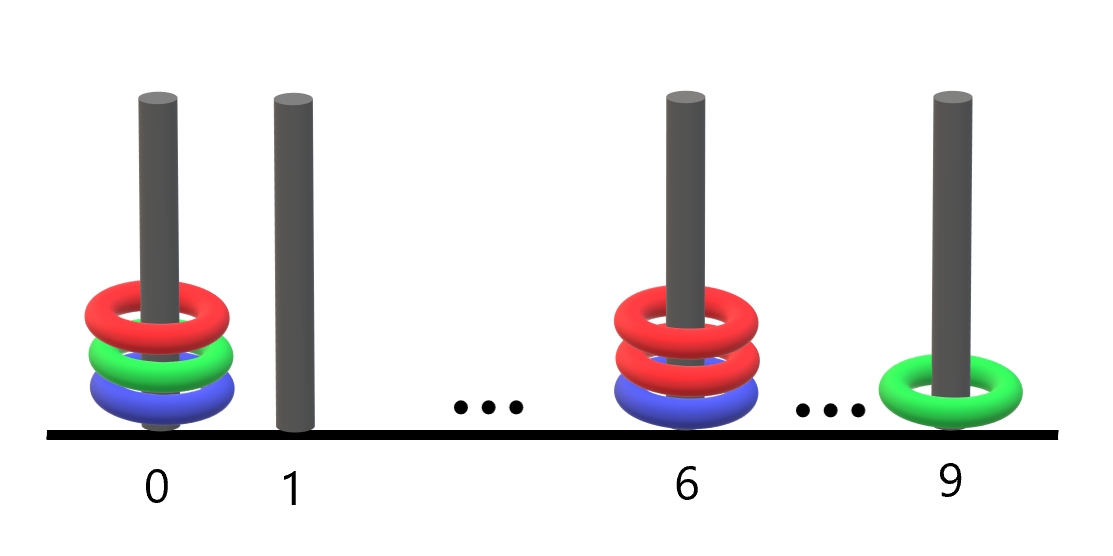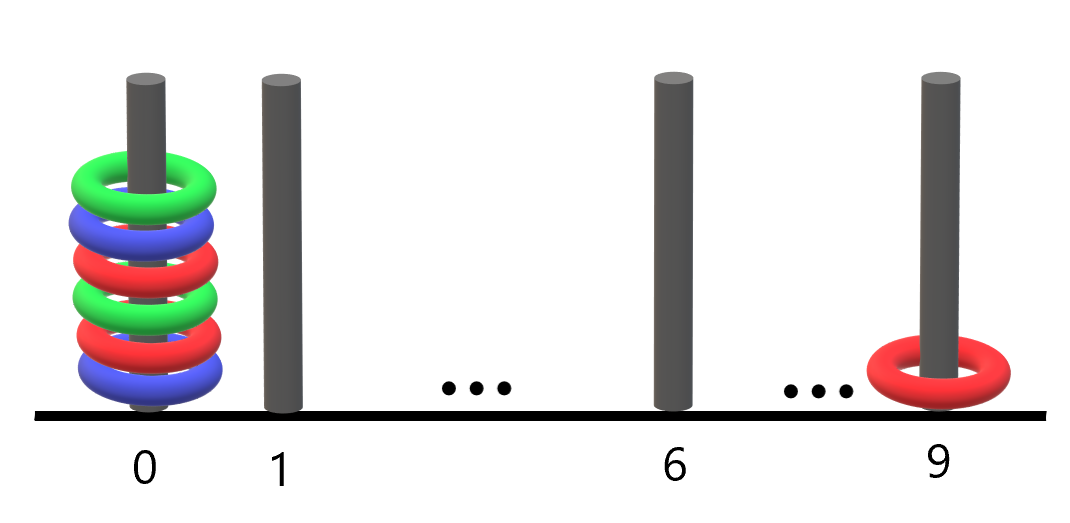There are n rings and each ring is either red, green, or blue. The rings are distributed across ten rods labeled from 0 to 9.
You are given a string rings of length 2n that describes the n rings that are placed onto the rods. Every two characters in rings forms a color-position pair that is used to describe each ring where:
- The first character of the
ithpair denotes theithring's color ('R','G','B'). - The second character of the
ithpair denotes the rod that theithring is placed on ('0'to'9').
For example, "R3G2B1" describes n == 3 rings: a red ring placed onto the rod labeled 3, a green ring placed onto the rod labeled 2, and a blue ring placed onto the rod labeled 1.
Return the number of rods that have all three colors of rings on them.
Example 1:
Input: rings = "B0B6G0R6R0R6G9" Output: 1 Explanation: - The rod labeled 0 holds 3 rings with all colors: red, green, and blue. - The rod labeled 6 holds 3 rings, but it only has red and blue. - The rod labeled 9 holds only a green ring. Thus, the number of rods with all three colors is 1.
Example 2:
Input: rings = "B0R0G0R9R0B0G0" Output: 1 Explanation: - The rod labeled 0 holds 6 rings with all colors: red, green, and blue. - The rod labeled 9 holds only a red ring. Thus, the number of rods with all three colors is 1.
Example 3:
Input: rings = "G4" Output: 0 Explanation: Only one ring is given. Thus, no rods have all three colors.
Constraints:
rings.length == 2 * n1 <= n <= 100rings[i]whereiis even is either'R','G', or'B'(0-indexed).rings[i]whereiis odd is a digit from'0'to'9'(0-indexed).
Using hash table.
class Solution:
def countPoints(self, rings: str) -> int:
mp = defaultdict(set)
for i in range(1, len(rings), 2):
c = int(rings[i])
mp[c].add(rings[i - 1])
return sum(len(v) == 3 for v in mp.values())class Solution {
public int countPoints(String rings) {
Map<Integer, Set<Character>> mp = new HashMap<>();
for (int i = 1; i < rings.length(); i += 2) {
int c = rings.charAt(i) - '0';
mp.computeIfAbsent(c, k -> new HashSet<>()).add(rings.charAt(i - 1));
}
int ans = 0;
for (Set<Character> e : mp.values()) {
if (e.size() == 3) {
++ans;
}
}
return ans;
}
}class Solution {
public:
int countPoints(string rings) {
unordered_map<int, unordered_set<char>> mp;
for (int i = 1; i < rings.size(); i += 2) {
int c = rings[i] - '0';
mp[c].insert(rings[i - 1]);
}
int ans = 0;
for (int i = 0; i < 10; ++i)
if (mp[i].size() == 3)
++ans;
return ans;
}
};func countPoints(rings string) int {
mp := make(map[byte]map[byte]bool)
for i := 1; i < len(rings); i += 2 {
c := rings[i]
if len(mp[c]) == 0 {
mp[c] = make(map[byte]bool)
}
mp[c][rings[i-1]] = true
}
ans := 0
for _, v := range mp {
if len(v) == 3 {
ans++
}
}
return ans
}function countPoints(rings: string): number {
const helper = (c: string) => c.charCodeAt(0) - 'A'.charCodeAt(0);
const n = rings.length;
const target = (1 << helper('R')) + (1 << helper('G')) + (1 << helper('B'));
const count = new Array(10).fill(0);
for (let i = 0; i < n; i += 2) {
count[rings[i + 1]] |= 1 << helper(rings[i]);
}
return count.reduce((r, v) => (r += v === target ? 1 : 0), 0);
}impl Solution {
pub fn count_points(rings: String) -> i32 {
let rings = rings.as_bytes();
let target = (1 << b'R' - b'A') + (1 << b'G' - b'A') + (1 << b'B' - b'A');
let n = rings.len();
let mut count = [0; 10];
let mut i = 0;
while i < n {
count[(rings[i + 1] - b'0') as usize] |= 1 << rings[i] - b'A';
i += 2;
}
count.iter().filter(|&v| *v == target).count() as i32
}
}int countPoints(char *rings) {
int target = (1 << ('R' - 'A')) + (1 << ('G' - 'A')) + (1 << ('B' - 'A'));
int count[10] = {0};
for (int i = 0; rings[i]; i += 2) {
count[rings[i + 1] - '0'] |= 1 << (rings[i] - 'A');
}
int ans = 0;
for (int i = 0; i < 10; i++) {
if (count[i] == target) {
ans++;
}
}
return ans;
}

